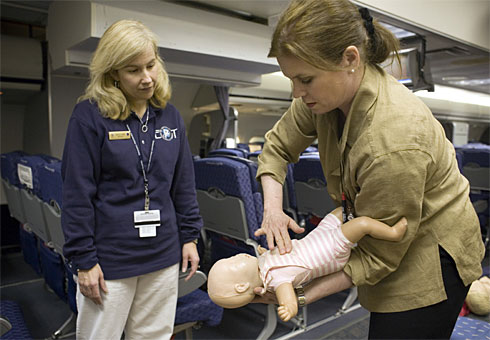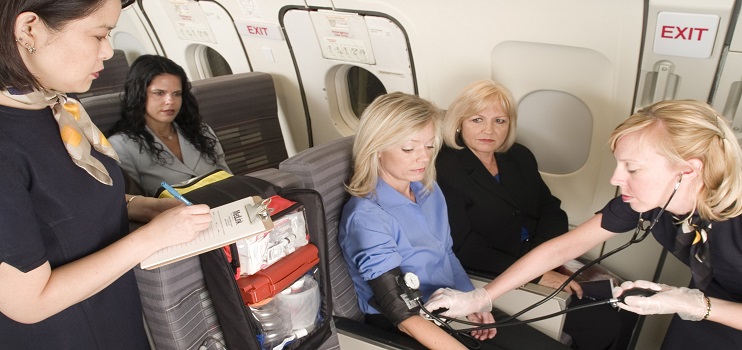UPMC service advises airlines on handling emergency illnesses
Medical problems can occur at the most inopportune times. Consider airplane flights and the classic cinematic trope, “Is there a doctor on board?”
Then add the fear of Ebola.
Dealing with on-board medical emergencies, especially ones involving Ebola-like symptoms of fever, aches and vomiting, represents the latest sky-high challenge for airlines.
While crews of 20 airlines worldwide do not include doctors, they have the next best thing. They use UPMC Stat-MD Communications Center on the 13th floor of UPMC Presbyterian as their airline medical advisory service.
In operation since 1998, Stat-MD, with about a dozen doctors trained in emergency medicine, takes calls from airlines round the clock.
The only other such service is MedLink, based in Tempe, Ariz.
The physician on call advises the crew about treating an ill patient or crew member with the onboard medical kit and investigates whether to divert the flight to the nearest airport or continue to its destination.
The service also is consulted about allowing sick people to board planes.
Ebola has heightened the need for in-flight medical advice.
“We’ve gotten a whole bunch of Ebola concerns, and we’ve been dealing with them since late March,” said T.J. Doyle, the UPMC center’s medical director. “One of our clients serves West Africa and some of the countries involved in the outbreak, so we’ve been involved in Ebola screening for some time, before it was even newsworthy in the United States.”
So far every suspected case of Ebola has turned out to be another illness.
“If we can assure a plane full of passengers and crew
“It mitigates situations where everyone shows up in full Hazmat gear.”
News last Wednesday that Dallas nurse Amber Joy Vinson had taken a round-trip flight on Frontier Airlines between Dallas and Cleveland shortly before being diagnosed with the Ebola virus fanned fears about airline travel.
Investigators are working to determine whether she had a slight fever, which is a sign of contagion, during both flights.
Stat-MD handles about 9,000 medical calls a year, with about 4 percent of those flights being diverted due to medical emergencies, Dr. Doyle said. Physicians gather information and assess the risk to the patient and others on board.
A University of Pittsburgh study of Stat-MD data, published last year in the New England Journal of Medicine, found most in-flight calls involve passengers or crew members fainting or feeling faint, respiratory problems or gastrointestinal symptoms.
A small percentage of in-flight medical emergencies end with death.
Consider that 2.75 billion people fly on commercial airlines annually with limited access to medical care.
“Medical advisory services like Stat-MD and MedLink are essential to helping our crew members manage inflight medical events,” said Michelle Mohr, spokeswoman for American Airlines, which uses both services.
She said crews are trained each year to manage medical situations. When a problem arises during a flight, the airline summons Stat-MD via phone or radio, providing them direct access to a physician. When Ebola might be involved, “using travel history is the key thing,” Dr. Doyle said.
“If the passenger is coming from Portland, Ore., and hasn’t been away from Portland, Ore., then it’s not Ebola. We get calls, and airlines use us to sort this out,” he said.
Domestic airlines are required to notify U.S. Centers for Disease Control and Prevention of any in-flight patients with Ebola-like symptoms, often based on Stat-MD recommendations. Stat-MD physicians are the ones who notify foreign public-health officials about potential Ebola infections on flights that took off from or are scheduled to land in their nations.
“With all the news from Texas, we are getting more calls from airlines, even ones not serving those regions [where infections have occurred], with the heightened awareness,” Dr. Doyle said.
Without a doubt, Ebola has made the traveling public more anxious, he said. “Flight crews are more aware than they are anxious but are using us as a resource when it happens because they get concerned, and we can get them the information needed.”
David Templeton: dtempleton@post-gazette.com or 412-263-1578.




